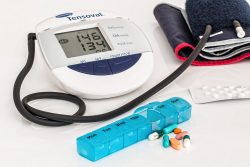How Does Outpatient Alcohol Detox Work?
According to the NLM, “If you have mild-to-moderate alcohol withdrawal symptoms, you can often be treated in an outpatient setting.” Outpatient alcohol detox is similar to inpatient treatment of the same nature, except the individual does not stay on at the facility overnight. But how does outpatient alcohol detox work?
Visiting the Facility
Contact Detox.com now to find outpatient alcohol detox centers near you!
Patients who are undergoing alcohol detox in an outpatient setting usually have to visit the facility often, especially in the beginning. “Daily visits to your health care provider are often needed until you are stable,” as stated by the NLM. This type of treatment is best for those who are experiencing less severe symptoms and who do not seem to be in immediate danger of experiencing delirium tremens, a much more intense form of alcohol withdrawal that includes hallucinations and seizures.
When an individual visits the facility, their treatment will often include:

You may be given medications and have your blood pressure tested during outpatient detox visits.
- Sedative drugs that help to ease withdrawal symptoms
- Counseling, both one-on-one and group, “to discuss the long-term issue of alcoholism”
- Family counseling to help with issues that have likely been troubling the relationships of the patient and their family members
- Blood tests
- Treatment and testing for other medical problems linked to alcohol use, including: depression, high blood pressure, arrhythmias (irregular heartbeat), liver problems, and mood disruptions
Patients will often attend treatment every day at first and then may be able to be downgraded to a less intense treatment regimen, especially if they are continuing to attend therapy or a support group for their alcohol abuse treatment. According to the NLM, however, it is difficult to know exactly how long outpatient detox for alcohol will last, considering the fact that symptoms “may persist for weeks.”
Living Situation
Even though a person in outpatient detox treatment will be experiencing milder symptoms than one attending inpatient treatment, it is still important that you adjust your living situation. The NLM states, “You will need someone to commit to staying with you during this process and who can keep an eye on you.” This is because, as stated by SAMHSA, “the course of alcohol withdrawal is unpredictable.”
It is difficult to be sure that someone will not experience life-threatening complications as a result of alcohol withdrawal, and some less severe symptoms can still cause dangerous issues. For example, a person suffering from mild depression during withdrawal may become worse if they are left alone, possibly leading to harmful actions.
If you are unable to have a friend or family member stay with you (or for you to stay with them) during this time, there are other options for your living situation during outpatient alcohol detox, such as:
- Sober living facilities
- Halfway houses
- Family facilities
- Full-time, at home nurses or caregivers
In general, outpatient detox is usually cheaper and can be attended while the individual is still living their life. This is why many people choose these types of facilities, which often fit easily around the rest of your responsibilities. Attending treatment daily and making sure that you are not living alone will be necessary at first to your successful outpatient alcohol detox.
Find outpatient alcohol detox centers near you by calling 800-996-6135 toll-free.

